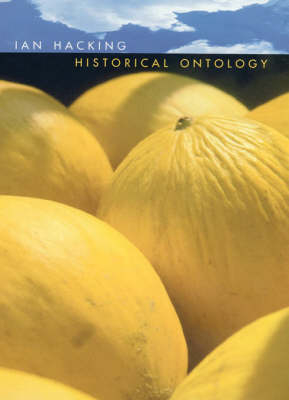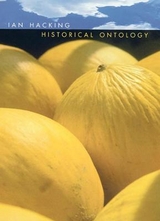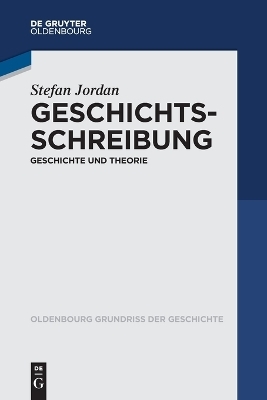
Historical Ontology
Seiten
2002
Harvard University Press (Verlag)
978-0-674-00616-4 (ISBN)
Harvard University Press (Verlag)
978-0-674-00616-4 (ISBN)
- Titel erscheint in neuer Auflage
- Artikel merken
Zu diesem Artikel existiert eine Nachauflage
In this text, Ian Hacking offers his reflections on the philosophical uses of history. The focus of this volume is the historical emergence of concepts and objects, through uses of words and sentences in specific settings, and patterns or styles of reasoning within those sentences.
In this text, Ian Hacking offers his reflections on the philosophical uses of history. The focus of this volume, which collects both recent and classic essays, is the historical emergence of concepts and objects, through uses of words and sentences in specific settings, and patterns or styles of reasoning within those sentences. In its lucid and thoroughgoing look at the historical dimension of concepts, the book is at once a systematic formulation of Hacking's approach and its relation to other types of intellectual history, and a valuable contribution to philosophical understanding. Hacking opens the volume with an extended meditation on the philosophical significance of history. The importance of Michel Foucault - for the development of this theme, and for Hacking's own work in intellectual history - emerges in the following chapters, which place Hacking's classic essays on Foucault within the wider context of general reflections on historical methodology.
Against this background, Hacking then develops ideas about how language, styles of reasoning, and "psychological" phenomena figure in the articulation of concepts - and in the very prospect of doing philosophy as historical ontology.
In this text, Ian Hacking offers his reflections on the philosophical uses of history. The focus of this volume, which collects both recent and classic essays, is the historical emergence of concepts and objects, through uses of words and sentences in specific settings, and patterns or styles of reasoning within those sentences. In its lucid and thoroughgoing look at the historical dimension of concepts, the book is at once a systematic formulation of Hacking's approach and its relation to other types of intellectual history, and a valuable contribution to philosophical understanding. Hacking opens the volume with an extended meditation on the philosophical significance of history. The importance of Michel Foucault - for the development of this theme, and for Hacking's own work in intellectual history - emerges in the following chapters, which place Hacking's classic essays on Foucault within the wider context of general reflections on historical methodology.
Against this background, Hacking then develops ideas about how language, styles of reasoning, and "psychological" phenomena figure in the articulation of concepts - and in the very prospect of doing philosophy as historical ontology.
Ian Hacking holds the Chair of Philosophy and History of Scientific Concepts at the College de France, and is a University Professor in Philosophy at the University of Toronto. He is the author of many books, including The Social Construction of What? (Harvard).
| Erscheint lt. Verlag | 5.6.2002 |
|---|---|
| Zusatzinfo | Ill. |
| Verlagsort | Cambridge, Mass |
| Sprache | englisch |
| Maße | 164 x 243 mm |
| Gewicht | 590 g |
| Themenwelt | Geisteswissenschaften ► Geschichte ► Geschichtstheorie / Historik |
| Geisteswissenschaften ► Philosophie ► Metaphysik / Ontologie | |
| ISBN-10 | 0-674-00616-X / 067400616X |
| ISBN-13 | 978-0-674-00616-4 / 9780674006164 |
| Zustand | Neuware |
| Informationen gemäß Produktsicherheitsverordnung (GPSR) | |
| Haben Sie eine Frage zum Produkt? |
Mehr entdecken
aus dem Bereich
aus dem Bereich
Russland, die Ukraine und der Westen
Buch | Softcover (2024)
De Gruyter (Verlag)
39,95 €
wie Irritationen historisches Denken anregen
Buch | Softcover (2024)
Kohlhammer (Verlag)
69,00 €
Geschichte und Theorie
Buch | Softcover (2024)
De Gruyter Oldenbourg (Verlag)
24,95 €



